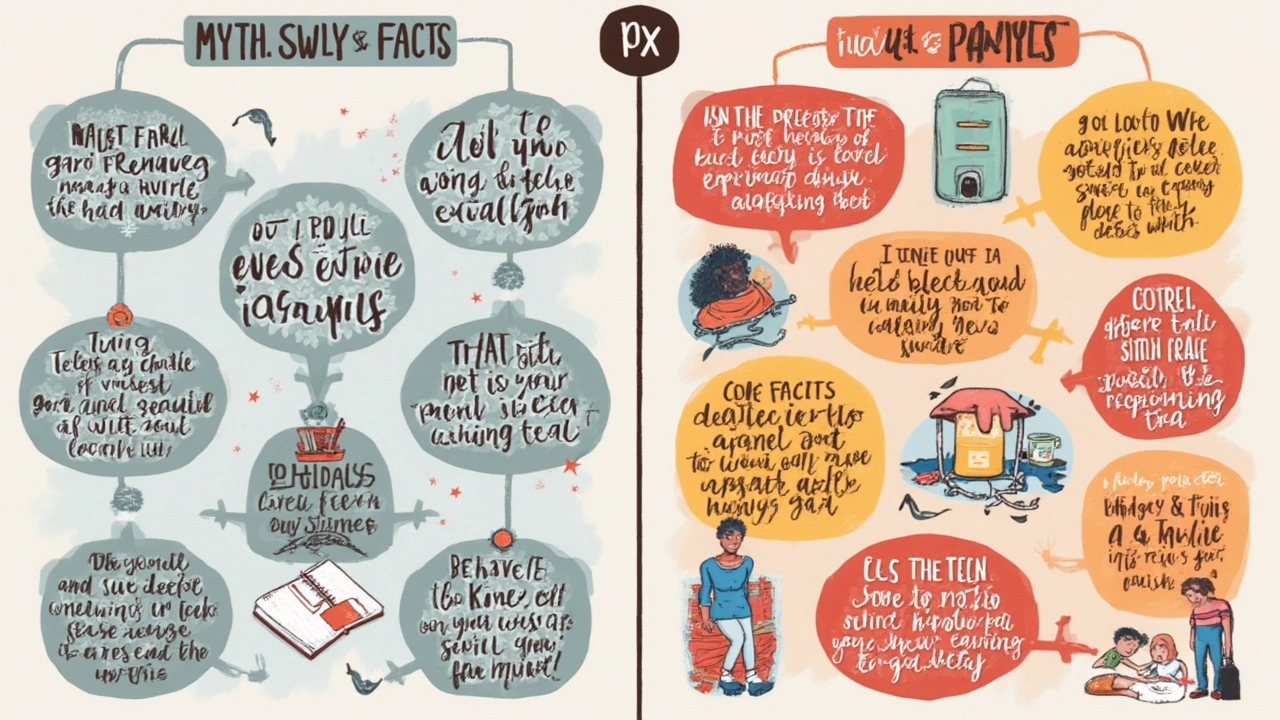Premenstrual Syndrome in Teens: Causes, Signs, and Support for Parents
 May, 13 2025
May, 13 2025
Imagine your usually cheerful daughter suddenly snapping at siblings, struggling to focus on homework, or just not seeming like herself. Is she being dramatic? Or is there something more at play? Welcome to the rollercoaster known as premenstrual syndrome (PMS) in adolescence—a phenomenon that hits way more teens than parents think, yet still gets swept under the rug. Most adults chalk it up to “just hormones,” but the reality is a lot more complicated. Instead of dismissing it, let's pull back the curtain and see what’s really going on—and more importantly, how parents can help, not just cope.
Why PMS Hits So Hard During the Teen Years
PMS isn’t just a grown-up problem. In fact, it often begins popping up in the couple of years after a girl’s first period. According to the American College of Obstetricians and Gynecologists, about 85% of menstruating girls have at least one PMS symptom monthly. Why does it feel so much worse in the teen years? Blame it on a perfect storm: puberty-turbocharged hormones, a still-maturing brain, loads of social and academic pressures, and often, a total lack of life experience with cycle management. The symptoms are real—teens aren’t just moody for the fun of it.
Most parents notice PMS tends to hit hardest right before a period actually arrives, typically in the luteal phase (about 1-2 weeks before menstruation starts). Estrogen and progesterone levels go on a wild ride, and neurotransmitters (like serotonin) can get thrown out of whack, too. For a teenager who’s already riding the puberty wave, these extra changes can hit like a tidal wave. Add in the pressures of school, friends, and body image issues, and you’ve got a recipe for monthly chaos. It’s no surprise that many girls feel like life just gets harder once a month.
What's wild is, not all PMS looks the same. While some girls just get headaches or feel a little tired, others deal with full-scale mood swings, crippling cramps, cravings for junk food, or even feelings of isolation or depression. One large survey done by the CDC in 2023 found that between ages 12-18, nearly 3 in 5 girls reported moderate to severe PMS symptoms. Compare that to their mothers’ generation—with worse awareness, less open talk, and little support—the numbers haven’t actually changed that much. The difference? Teens today might be under more stress than ever, with social media amplifying everything they feel.
Spotting PMS: What’s Normal, What’s Not, and What’s a Myth?
Every parent wonders: Is my daughter just having a bad day, or is this PMS? Spotting the signs isn’t always easy, but there are some classic clues. Emotional symptoms top the list—think irritability, sudden crying fits, or getting upset over things that usually wouldn’t matter. Trouble concentrating, feeling overwhelmed for no obvious reason, and getting into arguments more easily show up a lot, too. But PMS isn’t just emotional. Teens often complain about bloating, tender breasts, digestives issues, pimples, headaches, and energy slumps.
Check out this quick chart of typical PMS symptoms versus signs of more serious concerns:
| PMS Symptom | How Common | Red Flags |
|---|---|---|
| Cramping, headaches, bloating | Very common (70-80%) | Severe pain interfering with daily life |
| Mood swings, irritability, sadness | Common (60-75%) | Persistent depression, self-harm thoughts |
| Fatigue and sleep troubles | Common (50-70%) | Extreme exhaustion, can’t stay awake |
| Food cravings, appetite changes | Common (up to 65%) | Bingeing or restrictive eating patterns |
One huge myth is that PMS is “all in her head.” Science says otherwise. MRI scans have shown changes in brain activity tied to hormonal shifts, even in teens, especially in areas that control emotion and focus. Another myth? That PMS means something is wrong. For most girls, it’s just a sign the body is adjusting, not a medical emergency. But if symptoms last longer than two weeks, stop your daughter from doing everyday things, or if you ever hear talk about “not wanting to be here,” it’s time to see a doctor, no hesitation.

Practical Ways Parents Can Help (Without Saying the Wrong Thing)
It’s hard watching your daughter struggle and not knowing what to do. Here’s where parents make a real difference. First, skip the clichés like “you’re just hormonal” or “toughen up.” Teens crave understanding more than advice, especially about stuff that feels embarrassing or out of control. Start by listening. Sometimes just saying, “Hey, you seem off lately—want to talk about it?” is the best first step.
Now for the practical stuff. Keeping a symptom diary (there are apps for this, like Clue or Flo) helps spot patterns so everyone isn’t blindsided each month. If cramps and headaches keep showing up, talk to your doctor—sometimes, OTC meds like ibuprofen can be a lifesaver if taken early. Encourage healthier snacks at home (think nuts, fruit, yogurt), but don’t wage war over that late-night chocolate want. Staying active matters: studies show that teens who exercise regularly get milder PMS symptoms. Walking, biking, or even dancing in the bedroom counts (yep, really).
Sleep is another unsung hero. PMS zaps energy, so getting 8-9 hours a night makes a big difference. If your teen can’t sleep, try shutting off screens an hour before bed or using calming podcasts. Give her space to vent—but don’t let PMS become an excuse for harmful behavior. Boundaries matter. If tempers flare, keep your cool and revisit the conversation later. And don’t forget, some girls really benefit from talking with school counselors or joining group chats about period health. No shame—just support.
Navigating School, Social Life, and Mental Health Triggers
Here’s a fact lots of parents miss: PMS can knock out a teen’s focus, self-confidence, and friendships for a full week every month. Teachers might even mistake brain fog or introversion for laziness, or friends might accuse her of “ghosting.” That can turn into anxiety fast. Social media makes things messier; teens see “perfect” girls who never seem to struggle and wonder why they can’t keep up. Being open about PMS at home helps lessen the guilt and the sense of isolation.
You might notice your daughter skipping practice, ducking out of hangouts, or zoning out in class. Instead of just nagging, check if her period is coming up. Advocacy at school matters, too—some teachers allow water bottles and extra bathroom breaks during periods, but most don’t unless a parent speaks up. Some families help their teens email teachers a heads-up (nothing too personal, just “I struggle with headaches or cramps during my period”). Peer support helps—many schools now have period clubs or even organize educational workshops. That normalizes things and slashes the stigma.
Don’t ignore the mental health side. PMS can heighten anxiety and depression, especially in teens prone to mood struggles. Watch for warning signs: constant sadness, withdrawing from friends, or major changes in eating or sleeping. Mental health professionals can help screen for premenstrual dysphoric disorder (PMDD), which is PMS on steroids and needs medical care, not just empathy. Don’t wait—early support is always better.

Medical Options, When to See a Doctor, and New Research
If PMS symptoms knock your daughter out for days or interfere with school or sports, it’s time for a medical check-up. Doctors usually start by ruling out other causes—thyroid issues, endometriosis, and anemia can all look like PMS but need different treatments. A real diagnosis of PMS is based on tracking symptoms over at least two cycles. Treatment usually means a mix of lifestyle tweaks, medicine for pain, and sometimes birth control pills (which isn’t about sex, but about steadying hormones). Some teens respond well to antidepressants for severe mood symptoms, usually at very low doses.
New research keeps rolling in. Some studies found that vitamin B6, magnesium, and calcium supplements actually reduce cramps and mood swings for some girls—worth chatting with your pediatrician about dosages first. Cognitive-behavioral therapy (CBT) is getting more common for PMS and PMDD because it teaches teens strategies to handle moodiness and stress.
And don’t forget about family history. If a mom or older sister had rough periods, odds are higher the teen will, too. This isn’t about genetics only—it’s also about the coping skills kids see modeled at home (for better or worse). So the more openly families talk, the less alone everyone feels.
Here’s a quick rundown of when to see a doctor:
- Symptoms last more than two weeks or cause a teen to miss school or activities regularly
- Home strategies just aren’t working
- Pain is still awful even with over-the-counter medication
- Mental health red flags pop up (hopelessness, self-harm talk, eating issues)
Medical help is never a sign of weakness—it’s just common sense. With the right support, most teens can tackle even brutal PMS and start focusing on what matters: growing up strong, confident, and healthy.


Josh Arce
May 18, 2025 AT 13:15Bro PMS is just girls being dramatic. I mean come on, it's just a period. Stop making everything a medical issue.
Khaled El-Sawaf
May 19, 2025 AT 12:01While I appreciate the clinical framing, this article fundamentally misunderstands the nature of adolescent emotional regulation. The hormonal narrative is a convenient reductionism that absolves young women of personal accountability for emotional volatility. Neurochemical fluctuations do not excuse chronic irritability or social withdrawal - these are behavioral patterns that require discipline, not pharmacological intervention.
Furthermore, the normalization of symptom tracking via apps like Clue and Flo encourages hypochondriacal self-observation, reinforcing a victimhood identity rather than fostering resilience. The suggestion that parents should accommodate mood swings with 'space to vent' is pedagogically dangerous. Boundaries are not cruel; they are the scaffolding of maturity.
Historical precedent shows that prior generations endured menstruation without apps, counseling, or medicalized explanations - and still became functional adults. We are not helping by coddling. We are enabling.
The real crisis here is not PMS, but the erosion of stoicism in modern parenting. A girl who learns to manage discomfort is far more equipped for life than one who learns to label it a syndrome.
Let her suffer. Let her grow.
Nawal Albakri
May 21, 2025 AT 09:46ok but what if its not just hormones??? what if its the chemtrails?? i read this one girl in india she had PMS and then she started seeing shadows in the mirror and the next day her teacher said the school wifi is 5g and its making girls cry more?? and then i found this video on youtube where a guy in brazil said the moon is actually a satellite that controls our periods and its controlled by the illuminati and they use our blood to power the matrix?? i think the government is making girls have bad PMS so we dont protest??
also why do all the doctors only talk about ibuprofen and birth control?? they dont wanna tell us the truth!!
Musa Aminu
May 21, 2025 AT 09:50Yooo this whole post is just western nonsense. In Nigeria, we don't have time for PMS drama. We wake up, sell garri, carry water, cook for 10 people, and still smile. If your daughter can't handle her period, maybe she needs less TikTok and more responsibility. We don't need apps to tell us when we're tired - we just push through. Your 'support' is weakness dressed as care.
My sister had her first period at 11 and was back selling yams by 7am. No one gave her a hug and a chocolate bar. She turned into a queen. Maybe your daughter needs a good whipping, not a therapist.
robert maisha
May 22, 2025 AT 06:51The neuroendocrine modulation of affective states during the luteal phase is a well-documented phenomenon yet remains culturally minimized. The adolescent prefrontal cortex is still undergoing synaptic pruning rendering emotional regulation inherently unstable. To pathologize this as PMS is to misapply diagnostic frameworks designed for adults onto neurodevelopmentally distinct populations. The real issue is not biological but epistemological - society refuses to acknowledge that adolescence is not a failed adulthood but a distinct ontological state
Furthermore the suggestion of pharmacological intervention via birth control represents a form of chemical domestication rather than holistic support. Cognitive behavioral frameworks are superior but require institutional investment which is absent in most educational systems
Why do we treat biological rhythms as problems to be solved rather than natural phenomena to be understood
Alexander Ståhlberg
May 23, 2025 AT 15:29Let me tell you something nobody else will - this isn't about hormones. It's about control. The entire medical-industrial complex has turned PMS into a product line. Birth control pills? Check. Supplements? Check. Apps that track your moods? Check. Therapy? Double check. And who profits? Big Pharma. Big Tech. Big Parenting Consultants.
Meanwhile, real solutions - like teaching girls how to breathe, how to move their bodies, how to sit with discomfort - are ignored because they don't come in a bottle or a subscription box.
And don't get me started on the 'just talk about it' nonsense. Talking doesn't fix anything if you don't teach them how to hold their own emotional weight. You're not helping your daughter by letting her cry on the couch every 28 days - you're training her to be a victim of her biology.
She doesn't need more validation. She needs more strength. And the system? It doesn't want her strong. It wants her compliant. And that's the real tragedy here.
Eric Donald
May 23, 2025 AT 23:18I appreciate the nuance here. Too many people treat PMS like a joke or an excuse. But the science is clear - it's real, it's common, and it's often misunderstood.
One thing I’d add: sleep hygiene is the most underrated tool. A teen who gets 8+ hours of consistent sleep, even during the luteal phase, shows dramatically reduced irritability and brain fog. No app needed. Just a bedtime routine and no screens after 9.
Also, parents: don’t assume your daughter is being 'difficult.' Ask her if she’s feeling off - and mean it. Sometimes that’s all it takes to make her feel seen.
Brenda Flores
May 24, 2025 AT 20:30Thank you for writing this with such care. I’m a mom of two girls, and I wish I’d known all this when my eldest was 13. I used to say 'just get over it' - I didn’t understand.
One thing I learned the hard way: magnesium glycinate. Like, 200mg at night. It cut her cramps and mood swings in half. No joke. And I stopped buying junk food - switched to dark chocolate and almonds. She didn’t even notice, but she felt better.
Also, I started leaving little notes on her mirror: 'You’re not broken. This will pass.' She still keeps them. 😊
Jackie R
May 25, 2025 AT 12:42Stop enabling weakness. If your daughter can't handle her period, she needs discipline, not a therapist. This article is pure woke nonsense.
Eli Grinvald
May 25, 2025 AT 21:15My little sister went through this last year and I didn’t know what to do 😔 I just sat with her while she cried and held her hand. She said that meant more than any advice. I’m so glad this post exists. 💙
Alexis Hernandez
May 26, 2025 AT 01:38Man, I used to think PMS was just a myth until I saw my cousin go from laughing at memes to crying over a spilled soda in like 30 seconds. Then I started noticing how she’d zone out during homework every month - not lazy, just… drained.
Turns out she started walking 20 mins after school and it changed everything. No meds. No apps. Just moving.
Also, the chocolate thing? Totally real. But give her the good dark stuff, not the sugary junk. She’ll thank you later.
Parents - just be there. Don’t fix it. Just be there. That’s the magic.
Megan Oftedal
May 26, 2025 AT 02:19Hey, I just wanted to say I love this post - it’s so thoughtful! But I have to ask - did you consider the role of diet culture here? Like, when girls are told to 'eat healthy' during PMS but still get shamed for craving carbs, it adds so much guilt. Maybe the real fix isn’t just ibuprofen or sleep - it’s letting them eat the damn chocolate without judgment. 😊